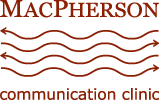Do I need a Doctor’s referral?
No, self referral is fine. We do recommend, however, that children complete a hearing evaluation with an audiologist. Also, with voice difficulties, we require an Ear Nose and Throat (ENT) specialist evaluation prior to our assessment.
Do you provide services for people with an acquired brain injury (ABI)?
Yes, we do. This is an area of clinical focus for the MacPherson Communication Clinic team. We are experienced in providing services to people with an ABI and have established valuable connections with other rehabilitation professionals in the community. We are also experienced in working with legal firms and insurance companies.
Will my child outgrow their speech difficulties?
Just like learning to walk, children’s speech develops in steps. While it is developmentally appropriate for a 3 year old to say “wabbit” for “rabbit” research suggests that the “r” sound should be mastered between ages 4 1/2 – 6 years*.
Persistent speech (or language) difficulties can negatively impact self-esteem, peer relationships and even learning to read.
If you have any concerns or doubts, an SLP will be able to determine if your child’s speech and language development is on track.
* Goldman et al. (2000)
Are SLP services covered by OHIP?
We are a private practice; therefore OHIP does not cover SLP or CDA services. Frequently, private insurers (EHB) cover a portion of our services. Please check with your insurance provider.
If your communication difficulties are the result of a Motor Vehicle Accident (MVA) or workplace accident, services may be covered by your auto insurer or WSIB.
For information on our rates, please contact our office.
What is the difference between a Speech-Language Pathologist, a Speech Therapist and a Communicative Disorders Assistant?
A Speech-Language Pathologist or SLP is a university trained professional who assesses and treats people that have a communication difficulty. In Ontario, SLPs have a Masters Degree (or equivalent) and must be registered with the College of Audiologists and Speech-Language Pathologists of Ontario (CASLPO).
SLPs used to be known as Speech Therapists (STs). However, today the title Speech-Language Pathologist (SLP) is preferred. This is to help the general public be more aware of the SLP’s role in working with other aspects of communication, not just speech or articulation.
All of our Communicative Disorders Assistants (CDAs) have completed a 4-year Honours B.A. in Linguistics and have earned a post graduate diploma in Communicative Disorders. CDAs are trained to assist an SLP and deliver therapy under the supervision of an SLP. In each individual case the SLP determines whether or not working with a CDA is the best course of action for individual therapy.
